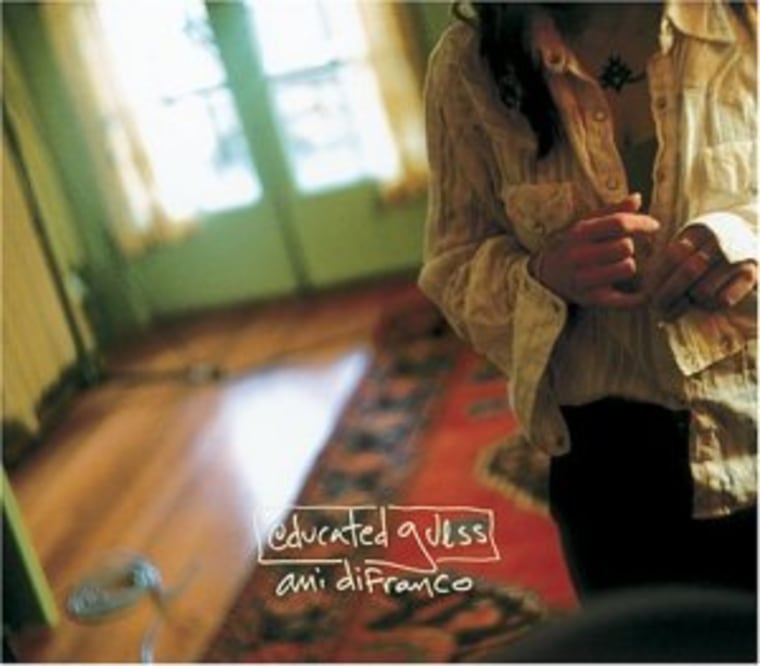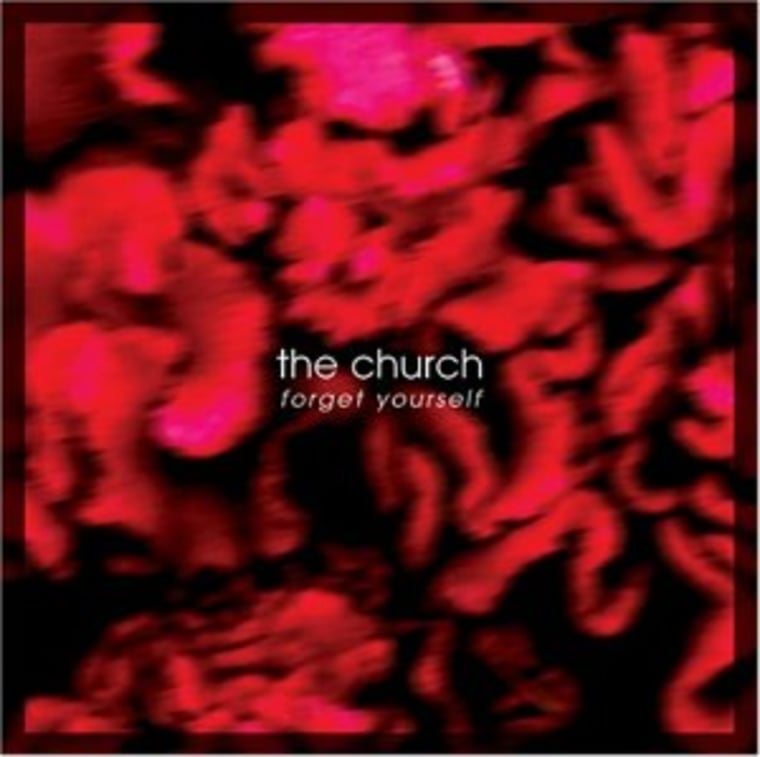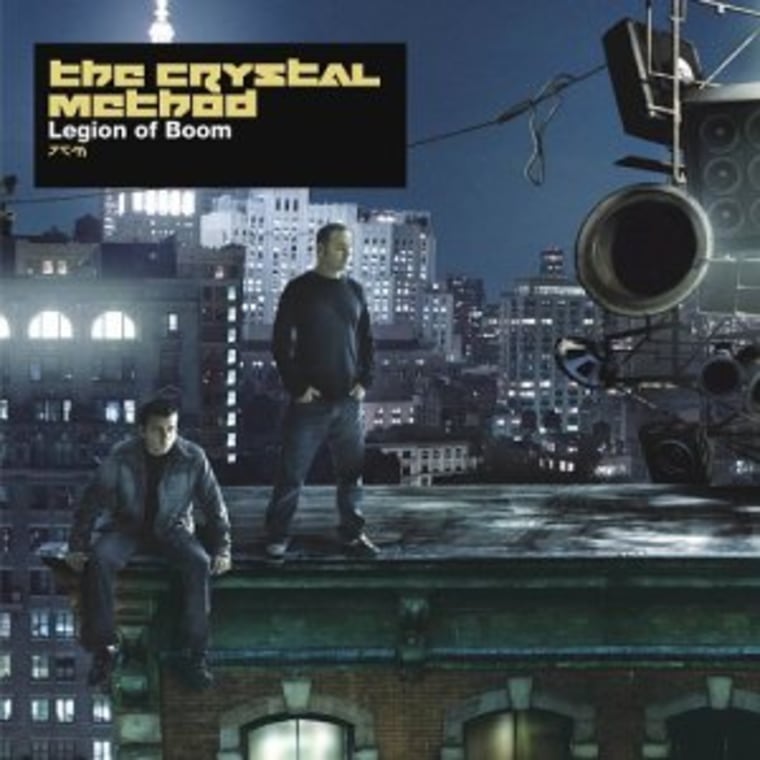Ani DiFranco makes a world-weary "Educated Guess", The Church asks you to "Forget Yourself" with their 17th album, John Vanderslide mixes hi-fi, lo-fi and why-fi on "Cellar Door" and the Crystal Method pump it up on "Legion of Boom" in this week's reviews.
“Educated Guess,” Ani DiFranco“Educated Guess” is a stark album, raw and bare and full of the yearning of a world-weary artist trying to reconnect with her place in the universe, musically and otherwise.
The conflict is most evident in DiFranco’s spoken-word personal anthem “The True Story of What Was,” with lines like “To search in the darkness for someone who looks like me (though I’m not really who I said I was or who I thought I’d be). DiFranco sings with the pathos of a musician who blazed a trail and is still figuring out where to go next.

Where she is on “Educated Guess” isn’t bad. Although the album can get a little too slow at times, its subtle guitar plucking and echoing lyrics show a maturity — DiFranco is settling nicely into a latter-day Joni Mitchell.
The album’s best track, “Bubble,” is also one of its most aggressive, with a slightly disjointed melody and the sparse acoustic guitar work that is becoming a staple of her recent tunes, especially on last year’s “Evolve.”
“Origami” is a melancholy reminiscence on love that is classic DiFranco, and “Grand Canyon” is a spoken-word-and-music track in which DiFranco shows she is sticking to her feminist, socially conscious guns.
“Educated Guess” is reminiscent of DiFranco’s guitar-and-vocal roots, but with less of the raw energy that permeated her early recordings. It seems that the singer-songwriter has calmed as she’s aged, leaving mania for melancholy.-- Angela Watercutter
“Immortal Memory, ” Lisa Gerrard and Patrick CassidyEthereal and almost unworldly in her compositions, Lisa Gerrard stakes out the high ground on her fourth solo LP. It’s alternately mysterious and lugubrious, in that way when the rain falls on a sodden spring afternoon and there’s nothing better to do than stare at the water and revel in the slow dive of a decaying afternoon.
The album’s 10 tracks, all co-written with classical composer Patrick Cassidy, are evocative of stylings both old and new. Underlying them is a chorale-like quality that places the listener inside an ancient granite cathedral. Others are akin to modern arias, floating gracefully and elegantly on spun circles of musical reverie.
Clearly her roots as half of the goth mainstays Dead Can Dance have played well into her maturation as a songwriter. The music on the nearly 58-minute disc is not for dancing, not for driving, but for relaxation, pondering and wondering.-- Matt Moore
“Forget Yourself,” The Church
The Church already were veterans when they produced their breakout 1988 hit, “Under the Milky Way.” While the band then returned to obscurity, they continued to turn out album after album of subdued, mostly high-quality guitar rock.

“Forget Yourself,” The Church’s 17th album, isn’t likely to restore the Australia-based band to the heights they reached during MTV’s “120 Minutes” era, but there are plenty of satisfying songs.
Steve Kilbey’s voice has its familiar mellow richness. He lends a fresh sound to the distortion-laden rock tunes that begin the album (“Sealine,” “Song in Space”), as well as the trio of beautiful songs in the album’s midsection (“Maya,” “Appalatia,” “June”).
Alas, many of the songs strain the listener’s patience for plodding psychedelia, and some of the lyrics, instead of sounding ethereal, are just plain hokey (“You’re blowing hot and cold/I want your heart and soul”). But there are enough profound moments to make it worthwhile for The Church to keep plugging away into old age.-- Landon Hall
“Cellar Door,” John Vanderslice
Want to hear something really different? Meet John Vanderslice.
His fourth album, “Cellar Door,” is lo-fi, hi-fi and perhaps even a little why-fi, all wrapped into a solid collection of indie-sounding rock with occasional strains of electronic back beats. It’s a marriage of techniques honed from Vanderslice’s days in the analog recording room at his Tiny Telephone studios in San Francisco.
His prowess shows here. Paramount to Vanderslice’s musical design is his ability to notice small things and details for their beauty. The result is beautiful music.
His poetic lyrics on the brief track “Wild Strawberries” are quite simply, haunting. “Wholly and totally brave I swam, under dying Filipino light.”
Other top-notch tracks include the soft and melodic “They Won’t Let Me Run,” a tale about cyclical small-town family values that can prevent personal growth and escape.
Don’t mistake Vanderslice for just any emo kid with an ax to grind. This guy’s heartfelt lyrics are born of brains and savvy.
The best track, however, borrows its lyrics from Percy Shelley’s nearly 200-year-old wartime poem “The Mask of Anarchy.” Vanderslice sets these words to driving guitar and a smashing drum beats.
When he sings “Free the blood that must ensue, we are many and they are few,” it’s almost mosh worthy.-- Ron Harris
“Legion of Boom,” The Crystal Method
The Crystal Method’s latest album is like most of their past music, in the best sense: thick and juicy techno with hearty beats and a spunky pace that can get your head bobbing in short order.

“True Grit” is a truly pumping track, with buzzing snippets of sound providing the melody as the heavy beats kick in. The pace of this song has energy, but it’s not so frenetic that it causes the anxiety that some other brands of techno can.
On the other hand “Weapons of Mass Distortion” cranks up the blood pressure a bit more. True to its title, this track features some heavy guitar distortion, as though Limp Bizkit had stumbled into a studio where Prodigy was recording a song and they all decided to jam together — and Fred Durst shut up. Nice.
Less-than-stellar tracks include the plodding “American Way,” which sounds like a decent idea on Valium. The featured rap is weak and the pace and scratch effects do nothing to modernize this song or bring this sleeper to life.-- Ron Harris